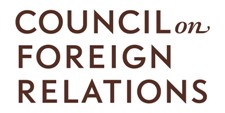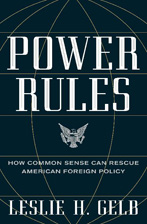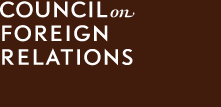 Navigation
Navigation
-
home > by publication type > books > Power Rules

 Email
Email
Book
-
Book

Related Materials
- In
the End, Every President Talks to the Bad Guys
By Leslie H. Gelb, President Emeritus and Board Senior Fellow, Council on Foreign Relations
Op-Ed
April 27, 2008
- Yielding
to North Korea too Often
By The Honorable Winston Lord, Co-Chairman, International Rescue Committee and Leslie H. Gelb, President Emeritus and Board Senior Fellow, Council on Foreign Relations
Op-Ed
April 26, 2008
- Declare
War
By Leslie H. Gelb, President Emeritus and Board Senior Fellow, Council on Foreign Relations and Anne-Marie Slaughter, Dean, Woodrow Wilson School of Public and International Affairs, Princeton University
Op-Ed
November 1, 2005
- Obama's
'Window of Opportunity' for Improved Russia, EU Ties
By Bernard Gwertzman, Consulting Editor
Interview
January 23, 2009
- Obama-Biden
Iraq Agenda, January 2009
Essential Documents
January 21, 2009
See Also
Power Rules
How Common Sense Can Rescue American Foreign Policy
HarperCollinsAuthor: Leslie H. Gelb, President Emeritus and Board Senior Fellow, Council on Foreign Relations
March 2009
352 pages
ISBN 9780061714542
$27.99Overview
From one of the nation’s leading foreign policy minds comes a provocative new account of how to think about—and use—America’s power in the twenty-first century.
Inspired by Machiavelli’s classic The Prince, Leslie H. Gelb offers illuminating guidelines on how American power actually works and should be wielded in today’s tumultuous world, writing with the perspective of four decades of extraordinary access and influence in government, think tanks, and journalism. He argues that Washington risks losing the essential life-blood of its national security—its power—unless American leaders relearn the lessons of how to use that power. Contrary to runaway fashion, Gelb argues that the world is not flat, power is not soft, and that we have not entered a post-American era in global affairs. The United States remains far and away the most powerful country in a world where power remains sharply pyramidal. But it is not the dominant power, and it can’t dictate to others.
“An indispensable book for the new era.”
—Ambassador Richard HolbrookeGelb persuasively shows that America’s future power must be based on the principle of mutual indispensability: Washington is the indispensable leader because it alone can galvanize coalitions to solve major international problems (and all nations know this), while other key nations are indispensable partners in getting the job done. The reality is this: succeed together or fail apart. Washington will also fail if it forgets that power is still, as in the days of Machiavelli, about pressure and coercion, carrots and sticks. Reason, values, and understanding are foreplay, but not the real thing. Gelb provides an incisive look at the major U.S. foreign policy triumphs and tragedies of the last half century, and offers practical rules on how to effectively exercise power today. Power Rules is an impassioned challenge to both liberals and conservatives and a plea to reclaim the true meaning of power and the essential role of common sense in solving global problems.
“If you care about America’s standing in the world—why it has declined, and how to restore it—this book is essential reading. Les Gelb, one of America’s most distinguished practitioner-observers of foreign policy, brilliantly explains how a series of administrations weakened our nation’s security, and shows how we can reverse this trend. Sparing no one in his analysis, Gelb shows how the U.S. failed to use its own strengths to achieve its stated goals, and offers, in succinct and user-friendly prose, the basic power rules with which the U.S. can—and must—restore its proper leadership role in the world. Power Rules is an indispensable book for the new era.”
—Ambassador Richard Holbrooke“Leslie Gelb has as much experience in foreign policy as anyone alive. Unlike most writers in this field, he isn’t afraid to use plain language and say what he means. He relishes hard truths. And he doesn’t mind making powerful enemies. All of these are prerequisites to writing a modern Prince—which is what Gelb has done. I don’t agree with all of it, but I greatly admire this handbook on the uses of American power in a complex age.”
—George Packer, New Yorker“Les Gelb tells it like it is: making U.S. foreign policy and using American power are common sense, not rocket science. Our leaders forget this truth at our peril. Incisive and thoroughly compelling, Power Rules is rich in colorful stories as well as in sound advice for our president and our people.”
—Brent Scowcroft, former national security adviser“Power Rules provides a much-needed antidote to the ideological fevers that have ravaged American statecraft in recent years. Leslie Gelb’s reflections on power, its effective use, and its limitations are shrewd, trenchant, and refreshingly devoid of either cant or partisanship.
—Andrew J. Bacevich, professor of international relations at Boston University“For years, Les Gelb’s friends have been learning about foreign policy by way of his wisecracks and anecdotes. In Power Rules, he shares a lifetime’s worth of wit and wisdom with the rest of the class. The amazing thing about this shrewd updating of The Prince is not just the insight Gelb brings to topic of America’s exercise of power in the post–Cold War, post-Bush world, but how entertaining he makes the whole subject. This book is a must-read not just for President Obama, but for anyone who wants to understand how the new administration can improve its odds of strategic success.”
—Jacob Weisberg, SlateLeslie H. Gelb is president emeritus of the Council on Foreign Relations and a former columnist at the New York Times, where he was awarded a Pulitzer Prize for Explanatory Journalism. Gelb has worked as a senior official in the State and Defense departments. He lives in New York City.
- In
the End, Every President Talks to the Bad Guys
-
New CFR Books

In Money, Markets, and Sovereignty, the authors present a fascinating intellectual history of monetary nationalism from the ancient world to the present and explore why, in its modern incarnation, it represents the single greatest threat to globalization.

In Power Rules, inspired by Machiavelli’s classic The Prince, Leslie H. Gelb offers illuminating guidelines on how American power actually works and should be wielded in today’s tumultuous world.

Russian Foreign Policy convincingly demonstrates that today’s Russia is more interested in restoring what its leaders consider to be its rightful place among the world’s major powers than in directly challenging the West.
Complete list of CFR Books.
New Book from CFR and the Saban Center at Brookings
Proposes Middle East Strategy for the Obama Administration
 In
Restoring the Balance: A
Middle East Strategy for the Next President, experts from the Council
on Foreign Relations and the Saban Center at the Brookings Institution propose
a new, nonpartisan Middle East strategy drawing on the lessons of past
failures to address both the short-term and long-term challenges to U.S.
interests.
In
Restoring the Balance: A
Middle East Strategy for the Next President, experts from the Council
on Foreign Relations and the Saban Center at the Brookings Institution propose
a new, nonpartisan Middle East strategy drawing on the lessons of past
failures to address both the short-term and long-term challenges to U.S.
interests. New Council Special Reports
Congo: Securing Peace, Sustaining Progress
 This
report lays out a thoughtful agenda for U.S. policy toward the Democratic
Republic of Congo, arguing that what happens there should matter to the United
States--for humanitarian reasons as well as economic and strategic ones.
This
report lays out a thoughtful agenda for U.S. policy toward the Democratic
Republic of Congo, arguing that what happens there should matter to the United
States--for humanitarian reasons as well as economic and strategic ones. Deterring State Sponsorship of Nuclear Terrorism
 In
this report, CFR Senior Fellow Michael
A. Levi analyzes the potential use of deterrence in preventing terrorist
groups from acquiring nuclear weapons and recommends a new approach to U.S.
declaratory policy, as well as ways to improve U.S. capabilities to determine
the sources of terrorist attacks.
In
this report, CFR Senior Fellow Michael
A. Levi analyzes the potential use of deterrence in preventing terrorist
groups from acquiring nuclear weapons and recommends a new approach to U.S.
declaratory policy, as well as ways to improve U.S. capabilities to determine
the sources of terrorist attacks.Complete list of Council Special Reports.
New Independent Task Force Reports
Confronting Climate Change
 This
report argues that the United States must lead with domestic action on climate
change and proposes a U.S. negotiating strategy for a global UN climate
agreement that includes commitments from all major economies, while also
promoting a less formal Partnership for Climate Cooperation that would focus
the world's largest emitters on implementing aggressive emissions
reductions.
This
report argues that the United States must lead with domestic action on climate
change and proposes a U.S. negotiating strategy for a global UN climate
agreement that includes commitments from all major economies, while also
promoting a less formal Partnership for Climate Cooperation that would focus
the world's largest emitters on implementing aggressive emissions
reductions.U.S.-Latin America Relations: A New Direction for a New Reality
 This
Task Force report examines changes in Latin America and in U.S. influence
there, while taking account of the region's enduring importance to the United
States. The Task Force offers an agenda for U.S. policy toward Latin America
and identifies four critical areas that should provide the basis of a new U.S.
approach.
This
Task Force report examines changes in Latin America and in U.S. influence
there, while taking account of the region's enduring importance to the United
States. The Task Force offers an agenda for U.S. policy toward Latin America
and identifies four critical areas that should provide the basis of a new U.S.
approach.About Independent Task Forces at CFR.
Terrorism Goes to Sea
This 2004 article argues that piracy is a key tactic of terrorist groups, a serious threat since most of the world's oil and gas is shipped through pirate-infested waters.
Subscribe Now and Save 47%!
Publications Information
To order Task Force reports, Council Special Reports, and Critical Policy Choices, please call, fax, or order online from our distributor, the Brookings Institution Press: phone +1.800.537.5487, fax +1.410.516.6998.
For information on other reports that are not for sale, or for general publications information, please call +1.212.434.9516 or email publications@cfr.org.
Permissions Requests
To request permission to reuse Council materials, please email publications@cfr.org or fax +1.212.434.9859.
Please include the complete information of the requested work—author, title, sections/pages to be copied or reprinted, and number of copies to be made—along with a brief description of where and how you would like to reuse the work.
You may also request permission for Council material through Copyright Clearance Center. For more information, please click on the link below.



